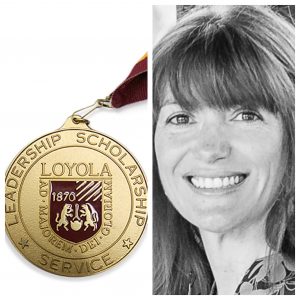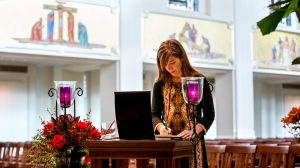IPS Student Alessandra Menendez Awarded 2017 President’s Medallion
November 14, 2017
Each year, Loyola University Chicago honors its most outstanding students with the President’s Medallion. This award recognizes students who exemplify the three words etched on the medal: leadership, scholarship and service. Representing IPS in the roster of university-wide medallion recipients this year is Alessandra Menendez, a Master of Arts in Pastoral Studies (MAPS-Religious Education) degree student.
“Each of the recipients was recommended for this award by their academic dean because they exemplify a wonderful combination of achievement in scholarship, leadership, and service,” said Jane Neufeld, vice president for Student Development. “In short, they are students for which Loyola and its founders can take great pride.”
We reached out to Alessandra to find out what this award means to her, as well as to learn how IPS has impacted her life.
Congratulations, Alessandra, on receiving the President’s Medallion. What does this award mean to you?
It represents my time at IPS — the beginning of my spiritual transformation, my awakening (metanoia), the time I made special friendships with peers and professors, the discovery of my own tribe. It also means the humility and gratefulness to receive, and to accept God’s gifts.
I understand you’re currently pursuing a MAPS-Religious Education degree here at IPS. Can you tell us a little bit about what you were doing prior to enrolling at IPS? How did you discern IPS to be your next step?
I volunteered over a span of thirty years as a catechist, a religious education coordinator and a Eucharistic minister in every parish in the places we’ve lived in (Buenos Aires, Argentina, Miami, Florida, São Paulo, Brazil, Wilmington, Delaware, Madrid, Spain and for the past thirteen years in London, England). I knew I had a calling to a vocation as a Religious Lay person and I needed better formation which is what led me to IPS.
What has your IPS journey been like so far? Any particular courses that have left an indelible mark? Memorable events outside the classroom?
It’s been as if someone turned a light on and I could finally see parts of my faith that were in the shadows. My very first class with Peter Jones IPS 570: Intro to Theology and Ministry was an epiphany. I finally had language to explain what I had lived in thirty years of ministry but especially the last thirteen years in London.
Dr. Marian Diaz classes IPS 416 and 417 gave me the confidence to question the manipulation of scripture to push an agenda and taught me how to actually explore the true meaning and context of the Bible. Professor Canaris’ classes IPS 402 Church & Mission and IPS 599 Teaching & Learning Church were foundational classes in understanding my own Church family. I had never read and analyzed an encyclical or understood how the Church arrives at what we know as truth. It is disturbing, upon looking back, to think that I spent thirty years in ministry and none of this formation was available to any of us parish volunteers. As a Church, we need to do more worldwide to give access to lay ministers to proper formation.
I experienced a spiritual conversion studying and engaging in discussions over the theology of grace and theologian Karl Rahner in both Dr. Russell’s classes IPS 531 Christian Doctrine and its History & IPS 541 Liturgy & Christian Sacraments. It was during these classes that I realized God’s grace, His free gift, and His irrevocable offer of His unconditional love for us. I knew it intellectually, but it was here when I received the grace to actually grasp what it meant about how I was called to love even those who fall short in loving me.
One of the classes which turned out to be a surprise was IPS 553 Christian Moral Theology & Ethics with Professor Dan Rhodes. I walked into the class with a mindset of right or wrong, left or right. There is so much more to Christian ethics than what people assume.
Even IPS 400 Professional Writing with Paige Warren and sharing our NPR “I Believe” with fellow student and friend Karen Flavin has been enlightening.
Two classes which were personally challenging and extremely rewarding have been IPS 555 The Human Person & Psychological Development with Professor Dean Manternach and Fr. Bill Creed’s IPS 572 Hearts on Fire: Ignatian Spirituality. These classes demand a journey within that can be very painful and yet, we work in ministry to journey together and become present in Christ to each other, especially in suffering – an inevitable experience and part of being human.
IPS 564 Foundations of Pastoral Care with Professor David Lichter equipped me with the knowledge to fully engage in pastoral care and even supported me throughout my own journey with cancer. The timing of these classes have been providential for me.
Some of the most memorable events outside of class have been my friendships at IPS. Meeting my friend Maureen Kurcz in person the first summer at IPS, after sharing an online class together was heart-warming. Also meeting one of the most outstanding fellow students and an amazing human being, Rainey Lamey, my first summer at IPS. I just knew I was home. Meeting, sharing and being ministered by fellow student and friend Peggy Flynn has been a true gift from God. Other experiences like sharing a Sunday worshipping together with fellow student and friend Shingai Chigwedere, my daughter Isabella and Professor Canaris in Chicago; and also having the opportunity to spend quality time in person with Professors Russell and Diaz. In addition, getting together in London with fellow student and friend Kathy North-Wilhelm and watching Scorsese’s movie Silence together, plus jointly contributing with fellow student and friend Amy Altheimer in the IPS’s student panel. And finally the times we scheduled on our own to share new knowledge with fellow students Greg Merideth, Ian Mitchell were truly special. Truly so many great memories including fellow student and friend Kelly MacCarthy, Ana Victoria Guizado; and so many outstanding people who truly make me feel that this is not just a place, it’s a family.
Can you give us a sense of your learning experience so far, from an online/non-US based student lens?
The difference in time zones can be challenging. I am in the UK and thus, six hours later in the day. Because the learning takes place on-line, I think it truly helped engaging with all opportunities available (online office hours, one-on-ones with professors, making use of the technology available to get together with peers in smaller groups, zoom, voice-thread, etc). My experience from being online and non-US based is that if one is engaged, the quality of the experience is completely transformed into something exceptional. It is truly up to the student to engage with the professors, engage with the material (hint: read ahead of time, don’t fall behind) and engage with fellow students. Three E’s: Engage, Engage, Engage! The challenge is not so much whether one is US based or abroad, online or in person; but to engage in building relationships, being willing to open up and discuss what is challenging. Always be accepting of others and contribute to a safe environment where we can truly learn from our differences and practice ministry before we go out to our wider worlds.
How have you ensured balance in your holistic life, given your IPS commitments?
I walked into IPS like a child in a candy store. I wanted to take it all in. Part of me wishes I could have done this twenty years ago, but I am also grateful God gave me this opportunity now. He knows best! Before committing, I discussed with my husband that I was going to need more support. We have three children, so there was extensive planning to allow myself study time (summer means one might be reading a few books in a week). As I mentioned, I had a breast cancer (recurrence) this summer. I don’t take the cancer lightly and I know balance, both mental and physical, is important. We spend an insane amount of time sitting (reading, researching, writing) so moving is very important. Even if it means stretching, going out for a brisk walk and breathing. Keeping hydrated, eating properly, all impacts our brain and our mood. Healthy minds in healthy bodies, but I also think our being is not separated in silos but intertwined (body, mind and soul).
How do you envision your time at IPS unfolding in the near term?
I am finishing my contextual education experience which has been both challenging and enlightening. I work at a nursing home/hospice in London (which can be challenging) and thus greatly appreciate the support provided by a learning community led by Professor Dan Rhodes. Also friend and fellow student Peggy Flynn has been a huge source of support as her specialty is end-of-life care. And Fr. Bill Creed’s Ignatian Spirituality couldn’t have been better timed than simultaneously with this experience. Therefore, I see this term unfolding as one of discernment about what the next chapter of my ministry will unfold to be.
As far as longer-term goals, where do you see yourself five years after completing your IPS degree?
A dream of mine is to see IPS launch here in London. If I could have a dream come true, it would be this one: for our local Church in London to have the grace of this kind of formation for both Lay and religious, so that the communal reality we live with the IPS family from Chicago extends to this side of the pond. Personally, I also see myself continuing on my path to formation. I would like to explore more pastoral ministry in non-religious environments (corporations, non-denominational secondary schools and university campus ministries that support those who do not adhere to any religious’ beliefs). How do we provide pastoral care using language that is universal enough to be inclusive without compromising what we do? We are not here to proselytize but to journey together.
Finally, can you share a personal spiritual practice that continues to restore and re-energize your mind, body, heart and spirit?
It might sound strange, but I re-discovered something my grandmother and the nuns at school taught me as a child when praying: bowing with one’s whole body. This is much more common in Asian cultures. It can be quite a workout for the body when one repeats this motion over and over, but what it does for the spirit is invaluable when we become mindful before whom we bow. It is so counter to our western culture to grasp that an act of humility (bowing) makes us stronger, but it does. I bring to mind everyone who’s crossed paths with me, and I bow to the presence of God in them and in me. It centers me and reminds me what is true. Try it one hundred times and then tell me after a week, how you feel. 😉
Congratulations, Alessandra! We applaud you for your dynamic leadership and creative, compassionate, and courageous service to church and society.


